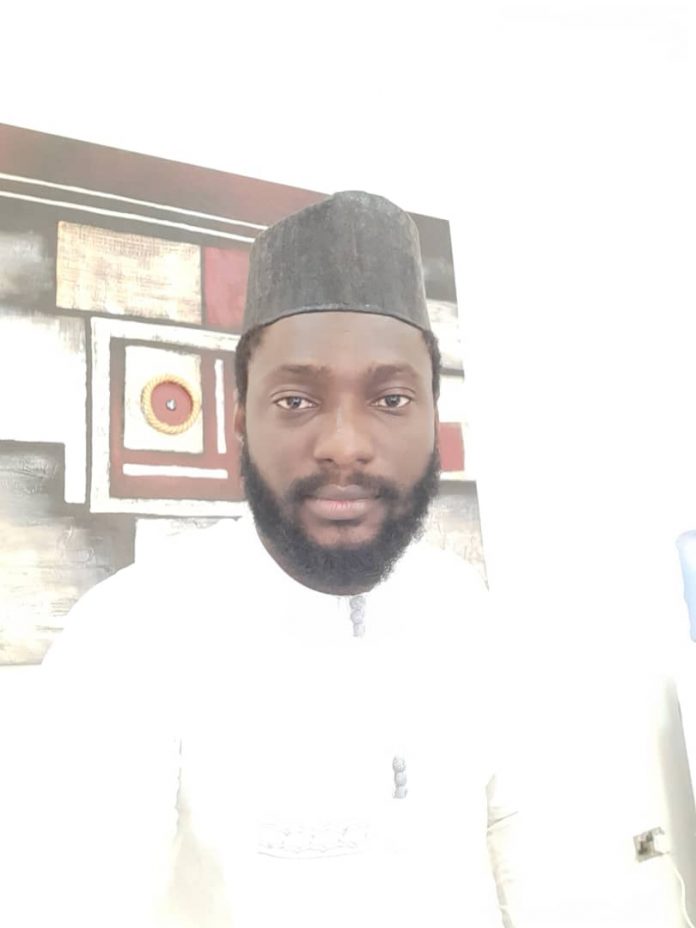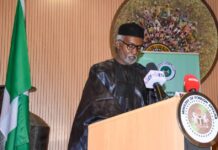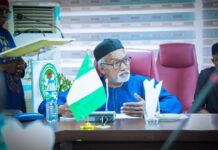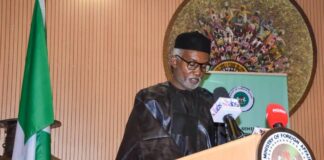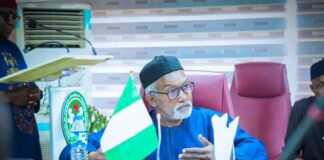Dr. Mukhtar Imam is a Public Affairs Analyst, a PhD holder in International Relations and a consultant in a couple of firms. In this interview with the Publisher of Business Review Afrika magazine, he shares his views on Nigeria at 60.
Helen Okon: Please, tell us about you.
Dr. Mukhtar Imam:
Okay, um, so my name is Mukhtar Imam. I have a PhD in international relations. I am lecturer, also a public affairs analyst and a consultant with a couple of firms.
Helen Okon: Thank you. Nigeria will be 60 in October. What did we not do since 1960 in terms of investment that has put us in a situation that looks like we are under pressure to get things done, now trying to catch up with now?
Yes, there’s a whole lot of catching up to do, to be fair to Nigeria, other states, Nigeria, within the comity of nations, as far as countries within international systems are concerned.
And there is one of falls within the category of bracket of new states, new states are states that are post Second World War independent states. And so, Nigeria basically has had to grapple with colonialism and the exploitation that came with it. Most gained independence after that period are trying to pull themselves together with the exception of China, even China as well, you know, so basically, we’ve had to missed opportunities in the past.
There have been decades of decay. As far as the quality and the economic political economic system is concerned, we’ve not basically done a needs assessment, a proper needs assessment to look at those very critical areas of foundational problems that Nigeria faces.
We’ve not been able to do a proper SWOT (strengths-weaknesses-and-Threats) analysis to see where our problems and prospects lie and these are some of the things that have dragged us to where we are now. But top of the list is the high handedness of leadership. We’ve had leaders who have exploited and extorted this country over the years.
I recall a Bloomberg report in 2003 to 2018 and 2005, that showed that Nigeria lost over 480 9 billion US dollars, when is that were taken from this country outside this is for the period of 19, from 1999 to 2005, you know, when we go back into the democratic system, so you see, these are some of the issues salient issues that Nigeria has had to grapple with. Over the years.
You look at the statistics on the list of countries with foreign direct investment, Nigeria is somewhere between 9-10 on the list, where you have Democratic Republic of Congo, somewhere sitting comfortably festal second on that list.
So, there’s a whole lot that needs to be done, we need to portray ourselves correctly. Diplomacy is very important. And diplomacy is not just a one-way traffic thing; diplomacy is multifaceted.
There’s the economic angle to diplomacy, which is the most important and essential aspect of diplomacy. There’s a military aspect of diplomacy does that does the individual which is what is called a citizen diplomacy, you know, the persona of the person who’s at the hands of affairs is also very important to who in for to woo in foreign direct investment. These are some of the areas that I feel we have lacked behind. Yes, we have made considerable successes on different fronts.
But there’s a whole lot more than needs to be done. And again, we must also understand that whatever we’re doing on the foreign front, our domestic environment needs to be put in order, because foreign policy and diplomacy are intertwined with domestic policies as well. What are the micro and macro-economic measures that are in place, how conducive is your environment for business, and so on and so forth? You know, until all these things are given attention, strengthened, then we will continue to face the gap that we’re currently facing.
I give a critical example. Nigeria is the largest mobile markets in the world. Yet we do not have a single mobile phone plant yet in Nigeria, look around you. There’s no Samsung plant and no Apple plant. Why is that? So, these are the very critical and cardinal questions that needs to be interrogated. We must have a proper social and open and honest conversation around how we were talking about investment.
See that people focus more on fate. Yes. What do you think about, I mean, we have states and local governments. Exactly. I mean, what can they do to also be part of the problems of all the challenges we face as a country are multi layered? They’re multifaceted, and so on and so forth. Part of the configuration.
I mean, the configuration is also part of the challenges that we’re faced with. You’ve heard people over the years talk about the need for restructuring, you ask 10 different people what is restructuring, you will get 10 separate responses. Now, there’s the need for a synergy between the local state and central governments. Part of the reasons why we’re faced with this challenge and we don’t even know where to turn to.
These are the legislations that have been created. We have a law that have taken 50 percent from recipient list and concurrent list and have me the Ruby concurrent exclusive list. So powerful. in simple language, the president of the Federal Republic of Nigeria is glued to immense power. So, what you have is that even when you have an honest president trying to explain to the regions, you know, to sit within the state in this regard to say, look, your state governors are coming in or taking resources, you should also hold them accountable. People do not want to listen to that narrative, because all they’re concerned with is the portion of the concurrent exclusive list, which put so much power in the central government. And so that narrative has trickled down to the average Nigeria, and all he is concerned about is a central government.
So, our constitution also needs a lot of tweaking, we need to go back to it. So much power has been you look at the mineral act, you look at the land use act, all of these things have positioned so much power in the central government. And these are laws we inherited from the 1946 Richard constitution. These are laws that he was from the mineral ordinance that put some all of the resources in the crown in England, and we have inherited and refused to change these laws.
These are some of the things that need to be done because the state governors are sitting fat too uncomfortable on so much resources without any justifiable end to that, you know, so these are some of the things I feel needs a lot of attention to state governments need to go out there and do their own beats in wooing investments. The local authorities also have to do the same as well, because they have funding for the funds. You know, and at the end of the day, this dude’s just these guys will sit and enrich themselves and leave office you see a local government Chairman leave office, he owns 10, or five prado jeeps in his house.
Well, I mean, where are these resources coming from? These are resources that are supposed to trickle down to the average man, they’re not dependent.
Helen Okon: Recently, the President said Nigeria would need to borrow some money to fund, infrastructural deficit? Should Nigeria continue to borrow?
DR. Mukhtar Imam:
Yes, we are, we have actually been borrowing. For the economy within about loans. The thing about borrowing we constantly talk about is that we must try to create a distinction between foreign loans which are coming from either multilateral agencies or the World Bank and IMF and domestic loans. But regardless, they’re both loans.
This is what the average Nigerian knows that the government is taking loans and overtime, it is his future that is being more mortgaged, right? Yeah, somewhere along the line, somebody has to pay for services. That’s the truth. But again, you come back to the other contending views that dictates and clearly so and rightly so, that when you look at the debt to GDP ratio that we have used, you will see that to be fair to the system or still within range, I think we still, we’re still dabbly doubling between somewhere between 18 to 20%. As far as GDP to that loan, I mean, ratio is concerned. But again, when you look at the debt to revenue ratio, it’s basically startling, the figure is very alarming.
And it poses a threat to the entire system. Because if you’re borrowing at that rate, and you expect to take that much amount of money, you know, the little that is left to develop infrastructure as capital projects, then nothing significant is going to be done. And these are part of the reasons why we’re saying government needs to also look to alternatives rather than just lending. There is no country in the world that is free from debt. There are lots of countries whose GDP to debt ratio is I think, the United States somewhere around 40 to 60%, to one world between 18 to 20%.
But that is not a justification, to continue to borrow, we need to also look at alternatives. But in the short term, what are the things that government should do? But again you must understand that the configuration and the individuals within this system tend to frustrate the system, so much so that even when you come with a good intention, and you’re trying to get something solid done, you cannot even survive it; right? You look at the civil service, for example, I look at the rot within our civil service, which nobody wants to talk about. It’s nowhere close to what is happening in the public service. Right? So long as we’re not able to block leakages, so long as we don’t cut wasteful spending.
So long as we don’t try to look at these areas where we can block the lacunas and use these resources that will be generated from there and put them back into infrastructural development, the deficits will continue to exist, so that no matter how much you’re borrowing, it’s going to go down the drain because these individuals are still sitting head high and waiting for the resources to come.
So, for me, I think the loan which the President is talking about, well, I wouldn’t say it’s a bad thing altogether, but what is the loan being used for and at the end of the day, are we going to see an efficient implementation or sustainability of what these loans have been used for.
These are the questions that I think Nigerians should begin to ask. And this has always been the issue. HELEN I mean, when you get the loan and the loan is not properly implemented exactly.
And in some cases, you find out, we take loans and we pay salaries, how can you pay back, you must, if you’re taking loans, it should be for something that is regenerated. If you’re taking loans, you must throw it into a sector where you’re going to have a return on an ROI return on investment that is going to be overwhelming, so that you are able to pay back these loans, you’re taking loans, these organizations and institutions are not Father Christmas, they want their money back somehow, you know, these are part of the reasons why we were stagnating, in my view, we need to begin to look at alternatives
Helen Okon: Is this good for the Nigerian economy at a time like this?
Dr. Mukhtar Imam:
Reality is it for one to make a rational assessment in this regard, we must look at the current situation on ground and be able to pick variables and match these issues of the phenomenon we are talking about, of lending and taking loans.
The government is doing fairly well enough. As far as infrastructural development is concerned, you look at the area of rail for example, they’re doing fairly well and we must give credit in that respect. You look at renovating and trying to re-equip our aviation sector, the airport, for example, but lot is going on. Most, if not all federal roads at the moment are undergoing construction. Yes, we have reservations as far as the speed of construction that is going on is concerned. But have these things been awarded? Are they been executed? The reality is yes. Right.
So, and then, of course, funding in areas of human capacity development, and so on and so forth, we see that the government is doing fairly well, even though there are reservations, again as to what the Ministry of Humanitarian Affairs, for example, is doing in terms of giving out interventions for the social intervention programme. But the truth is, because we see these things happening, we might want to see the government is moving in the right direction.
Now, the thing about infrastructural development and capital project is you don’t get the results overnight. The result is not in one year or two. The result comes over time. And this is where the government needs to understand that why you’re investing in infrastructure development, also invest in your people as well, so that you can have a balanced growth as far as economic prosperity is concerned.
Helen Okon: Talking about investing in people. Just recently, the Federal Government of Nigeria released about 5 billion as part of their mitigation measures for small businesses. What do you have to say about this?
,
Dr. Mukhtar Imam:
Well, it’s really timely. The government in this regard, I would give the government kudos, because COVID-19 came with a lot of issues. We were dabbling between trying to save lives and protecting livelihoods.
We’re talking about a country on an economy where 75% of its population is in the informal sector, we’re talking blue collar job brackets, people who go out for a living every day and return home. So, giving such interventions is very timely, especially at the time that we’re in where a lot of economies are suffering the same fate. Well, again, as you may know, it’s as a result of the intervention of the social economic, or the sustainability economic plan that Nigeria’s economy is not shrinking to the level which it would have contracted to if , we did not see these interventions.
Because the IMF and the Bloomberg were projecting that Nigeria’s economy was going to contract at about 8.8 to 9.2%. As far as GDP, as far as recession, this is a negative I’m talking about here, we’re in the negative already, by the way, we’re in a recession, what the depth of the recession is what we’re talking about here. They were projecting 8.2 8.8 to 9.2. But as a result of the interventions, we’re beginning to see, from the period of the disbursement of the first phase of the sustainability plan, which was supposed to be post Economic Recovery Growth Plan (ERGP) programme, that will be like an intervention for the COVID. It’s meant to serve like equality.
This is where part of the 94.75 billion is coming from, you know, so that intervention is very timely, it’s really helping, I feel overtime, it’s going to make an impact. But then again, of course, a lot more needs to be done. You see, the only way you can understand how the system works and be able to put measures in place, that mechanism that will aid you in addressing some of these social deficits is that you must have a proper database for people to see. Look, there are a lot of social intervention programmes going on all over the world.
What we must understand is that there are very important mechanisms that are put in place to be able to identify the end, the receivers, the people who are at the receiving end of all of these things we’re talking about.
So, if you do not have, if you have not captured these individuals, how then do you go about these bossiness resources, because at the end of the day, you’ll be duplicating efforts. At the end of the day there could be favoritism. At the end of the day, you could find that you have captured a certain bracket that are not within the expected or target population.
So, there’s the need for government to step back a bit. Look for mechanisms of listening to the Minister, Sadiya Umar Farouk the Honorable Minister of Humanitarian Affairs, she was talking about some mechanisms that they have designed to be able to capture this.
And I think that’s a good step. But a lot more needs to be done else, a huge chunk of the population who are supposed to be with within the brackets of beneficiaries will be left out of the scheme. And at the end of the day, these are the same individuals who would be out there suffering, and perhaps might be a very good and fertile breeding ground for all sorts of violence groups, and they will find their way into them, which is not going to be good for the country, especially now that we’re moving towards our 60th year of independence.
Helen Okon: That is very important, you just talked about violence, the rate of violence in Nigeria, with the young people. What do you think, can be done to bring the youth out of the street?
Dr. Mukhtar Imam: You see, for me, it’s about finding the ultimate solution. Nigeria, as a configuration has a lot of challenges, because of time, we will not be able to go into all of the details of the issues. But also, talking about those things that, I feel are the challenges.
One is that our problem is not about our political system. It’s not about our governmental system. People were talking about restructuring going back to the old, that is not going to solve the problem. Nigeria’s problem is not about our micro and macro-economic policies.
Nigeria’s problem is about us, our social, psychological make-up as human beings, we need to begin to re-orientate ourselves, else we’re not going to get out of this mess, we’re going to be stuck in it as a result of the things that govern I suppose, we think religiously, ethnically, we think regionally: favoritism, we think along this primordial and myopic course, this is what governance is total, most of us, including those who you find in the academic environment, there’s a distinction between being educated or being left out.
We have a lot of reading, writing illiterate working on streets. These are the people who constitute our unrepentant ethnic warlords; these are the people who constitute religious bigots, even though they’re lettered, they’re still not educated.
So, we need to change our mind frame. For me, it’s not about fiscal restructure, it’s about physical restructuring, change your brain first. So, nothing is going to work, your leader will consistently take advantage of you, because we are proven to them that more people have low intellectual standing. So, the pre or the pre on that they take advantage of that. And then they exploit us, the ordinary people. These are the issues now, as far as matters of security is concerned.
You see, there are two main issues, like I said, the things that are leading to so much insecurity all over the world. I’m talking globally now.
The huge gap in wealth distribution .The huge divide in income inequality. And Thirdly, perhaps, is an adjunct to justice or injustice. Because once you have a proper system that gives distribution of wealth, adequate and equitable consideration, and you have wealth and income inequality on the path, trust me, this issue of insecurity or security is going to naturally tame itself, because humans according to Karl Marx, in his historical and dialectical materialism arguments, we exist for our material wellbeing if people feel alienated from that material world, trust me, it is bad, and is just natural.
So, all these things we hear about criminal bandits and so on and so forth on the rise. It stems from the fight for material wellbeing Until we correct that, We will continue to be in the circle. Look around you look what’s going on. The rich are getting richer, the poor are getting poorer, globally, and you expect people to live in peace, how even man cannot go out and get milk and bread for his daughter is wilder than the beast. This is the irony.
Okay, thank you so very much.


